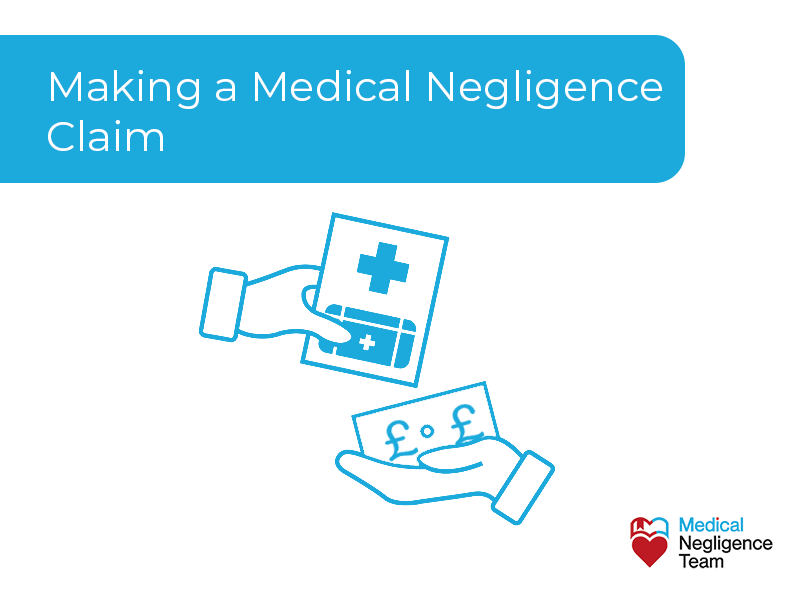GP negligence is when the care provided by your GP is so poor that no doctor acting reasonably would have provided such care. If the substandard treatment from your doctor causes you injury or worsens your symptoms, then you have a GP negligence claim.
If you have been a victim of GP or doctor negligence, then you should approach a No Win No Fee medical negligence solicitor. If a family member has a reduced mental capacity you may make the compensation claim on their behalf.
The solicitors will listen to your case, obtain your GP records and confirm that you have been a victim of GP clinical negligence.
Only by getting your case details can they value your claim to determine how much compensation you are entitled to for the negligence.
Your solicitor will advise how to sue for GP medical negligence and guide you through the process.
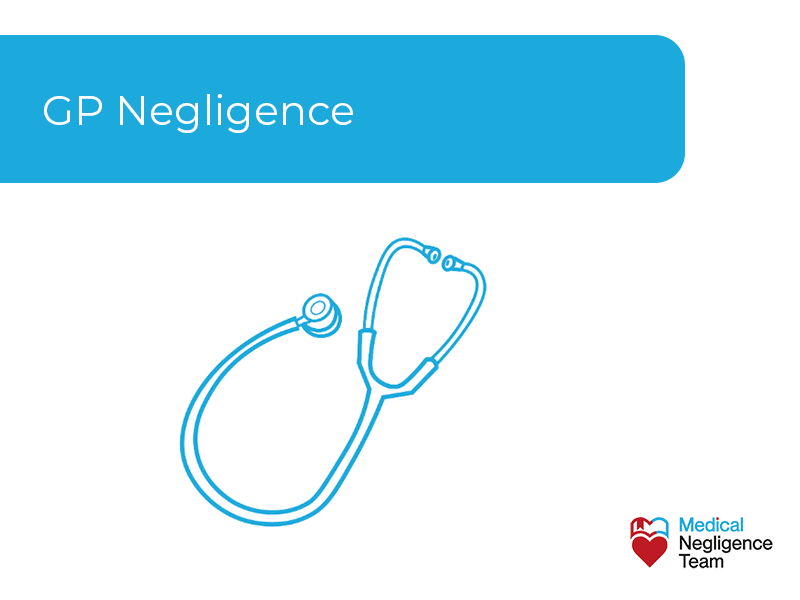
Table of content
What is GP negligence?
GP negligence is when you get substandard treatment from your doctor. When you go to the GP’s surgery, you expect quality care, not negligent treatment, which makes you ill or puts you in hospital.
Every GP should use NICE guidelines for assessing a patient’s symptoms and illness when they see them at the surgery. NICE, National Institute for Health and Care Excellence, guidelines are for GPs to follow when seeing patients at a surgery.
When a healthcare professional does not follow or overrides these guidelines, you could experience negligent medical treatment from your doctor.
GP clinical negligence arises from such common mistakes as:
Let’s take a closer look at GP medical negligence.

Failing to refer a patient for further cancer investigations claim
Failing to refer a patient for further cancer investigations can accelerate the spread of the disease. If someone worries they have cancer, their GP should use the NICE guidelines to assess whether the patient should receive an urgent two-week wait for a cancer referral.
Missing the clear symptoms, or failing to act on the signs, of bowel cancer, for example, such as bleeding and weight loss, can have a devastating effect on a patient.
Your GP should assess your condition, use available NICE guidelines, and refer you for further cancer investigations if necessary. Failing to do so is negligent medical treatment from a GP.
Misdiagnosis of a serious condition claim
Misdiagnosis of a serious condition means delayed treatment and the disease getting worse. A small lump is said to be a benign cyst while it grows into a cancerous tumour. Instead of spotting a cancer’s beginnings, your GP misdiagnoses it as a minor ailment.
Every GP should be awake to the early signs of a serious condition. Early intervention and treatment are vital to successfully fighting cancer.
If a GP misses the symptoms, and dismisses your worries as an overreaction, you may be able to claim compensation for the negligent treatment.
Misdiagnosis of the condition will only do a patient harm.
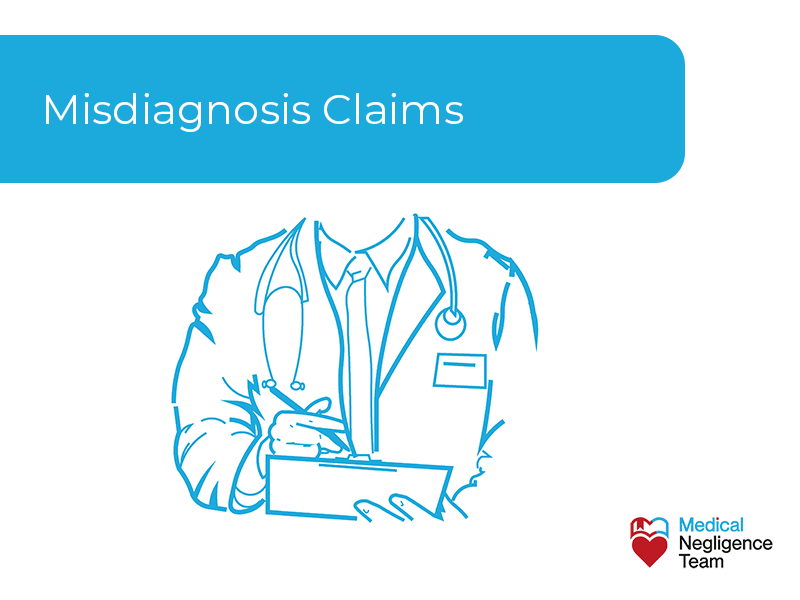
Failing to act on results which would have warranted a consultant referral claim
Failing to act on results which would have warranted a consultant referral costs time and lives. The GP has the results of a scan or blood test, which show signs that all is not ok with you. Instead of referring you for a consultant appointment, your GP lets the results lie to see what happens next.
Clinical negligence claims come from when the doctor does not refer you for a second opinion. A consultant is an expert in their field, and their opinion is vital. Not giving you that valued referral for expert treatment is a severe dereliction of duty.
Failing to act is GP negligence with serious consequences.
Failing to action medication requests or investigations requested by A&E or a consultant claim
Failing to action medication requests or investigations requested by A&E or a consultant is terrible GP negligence. You have visited A&E or a consultant as you are experiencing serious symptoms and the medical professional sends you back to the GP with a note for medication or an order for further investigations.
Instead of acting on the consultant’s letter, the GP carries on with your treatment as before. Either they fail to read the letter thoroughly or choose to ignore what they write about you.
Meanwhile, you do not get the medication prescribed to treat your symptoms.
An investigation of that sore back is not ordered. You only get worse instead of seeing an improvement—GP negligence which cannot be ignored.
Prescribing an incorrect medication claim
Prescribing an incorrect medication can be just as bad as not prescribing one at all. An incorrect medication may have zero effect on your condition and, in many cases, may worsen your symptoms. Medication is prescribed to treat an illness; the incorrect medication never works for you.
You may be allergic to an incorrect medication. If you are allergic to a medication such as penicillin you will have a serious reaction. If the GP fails to read your records properly and prescribes an incorrect medication, the results can be life-threatening.
An example of GP negligence which we hear of regularly.
Can I sue my doctor for negligence in the UK?
You can sue a GP for negligence in the UK. Every day people in the UK sue their doctor or GP for clinical negligence compensation, and it is not difficult to sue your doctor or GP for negligence.
With the right solicitor on your side, who will handle your case correctly, you should see a successful conclusion to your GP negligence case. Every negligence case is different, but the process of suing your GP is the same.

How to obtain compensation for GP negligence
You obtain compensation for GP negligence by suing the NHS through your No Win No Fee solicitor. GP negligence claims are handled by an NHS department known as NHS Resolution. Once your claim is submitted to them by your negligence solicitor, they have four months to respond.
Specialist medical negligence solicitors will guide you through the steps in claiming medical negligence compensation. The solicitor can advise you on how and when to settle your claim.
What steps are involved in claiming GP negligence?
The steps involved in claiming GP negligence are easy to follow and are the only path to success in a compensation claim. The following steps will be needed for a successful GP negligence claim.
Step 1: Finding a solicitor
Finding a no win no fee medical negligence solicitor to take on your GP negligence case is the first step. You need a solicitor with the experience to guide you every step of the way. When you find the right one, they will send you an agreement to sign, known as a conditional fee agreement (no win no fee) and a medical request form.
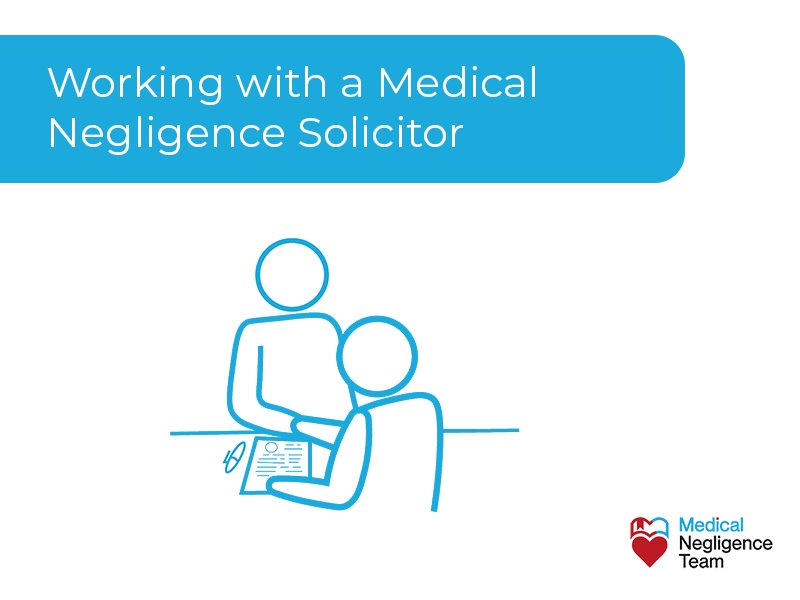
Step 2: Paperwork
Doing all the paperwork takes time but is an essential first step in the process. The completed medical records request form will allow your solicitor to make a subject access request (under GDPR) for you or your loved one’s GP, and any hospital records.
Your solicitor can then assess the records and confirm that you have a GP negligence case.
We pride ourselves on our fast and effective work at each stage of the medical negligence claim process.
Step 3: Filing the compensation claim
Filing the compensation claim will only happen when everything is in order. When your solicitor sees where the GP’s negligence occurs, they will complete your file. The solicitor will then send a letter of claim to the negligent GP and NHS Resolution, who have four months to respond.
When negligence is admitted, your GP negligence solicitor will value your case to confirm the amount of compensation due for GP negligence.
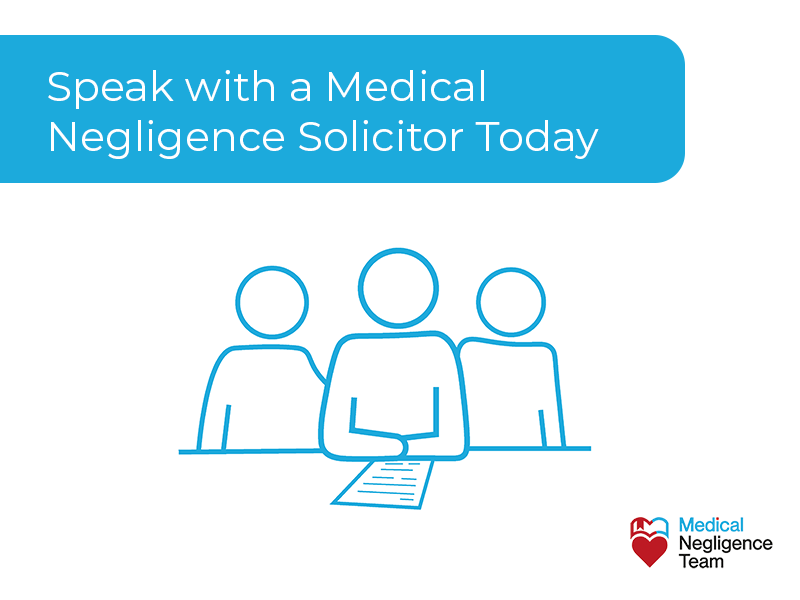
How much can I claim from a GP negligence case?
You can claim compensation for GP negligence from £1,000 to £ms. The amount you claim in compensation depends on the injuries sustained and also any care required in future life.
If the key earner for your family passed away due to GP negligence, you claim for future earnings. With this claim, you look for compensation for the salary they would have continued to earn but for the GP negligence.
Future earnings can push the GP negligence compensation claim into the higher amounts.
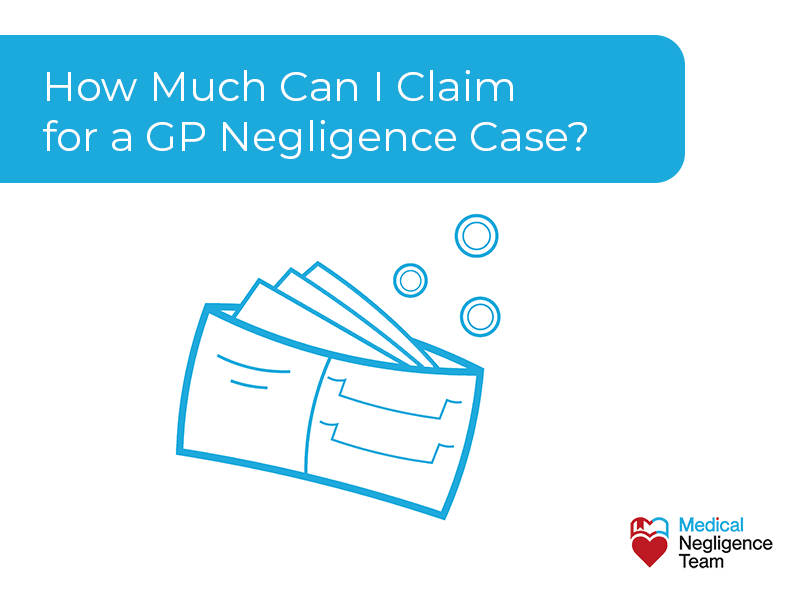
Claim for the loss of a loved one as the result of GP Negligence?
When a loved one such as a husband, long-term partner or child under 18 passes away due to GP negligence, you claim for bereavement. It is a special claim and an extra part of the overall compensation claim.
A bereavement award entitles you to a payment of around £15,000 plus all funeral expenses.
Compensation types?
You claim two types of compensation in a GP negligence case.
Type 1: General damages
General damages are for pain, suffering and loss of amenity (PSLA) or the injury itself. The amount of compensation depends on how much discomfort you experience or the extent of injury from the GP negligence.
Type 2: Special damages
Special damages are for loss of earnings, care costs and out-of-pocket expenses. You sue for compensation if you cannot work while recovering from GP negligence. Any extra medical treatment and special care need to be paid for, usually by you at the point of entry.
Out-of-pocket expenses such as travel, hotel stays and meals are refundable in a medical negligence compensation claim.
Always keep payslips and receipts as evidence of special damages.
Can you report GP negligence directly?
You can report the GP’s negligence directly to the relevant body. This complaint process however, will not get you financial compensation for negligence.
How to report a GP or doctor for negligence
To report a GP or doctor, you first submit a written complaint to the GP practice. They will review your case and send you a written reply.
If you are unhappy with the response, you may decide to involve the ombudsman or report the GP to the General Medical Council (GMC).
A written complaint by an individual to a GP will not result in compensation being obtained. To obtain payment for GP negligence, a No Win No Fee medical negligence solicitor must submit your claim to NHS Resolution.
Begin your Medical Negligence case today
We know how to fight your GP negligence case.
Our experience will guide you through the legal process and reach a successful conclusion. With our No Win No Fee policy, you will not be out of pocket. Our 100% Compensation Guarantee puts all the money straight into your hands to spend on your needs.
Contact the Medical Negligence Team today and get started on your GP negligence compensation claim.
